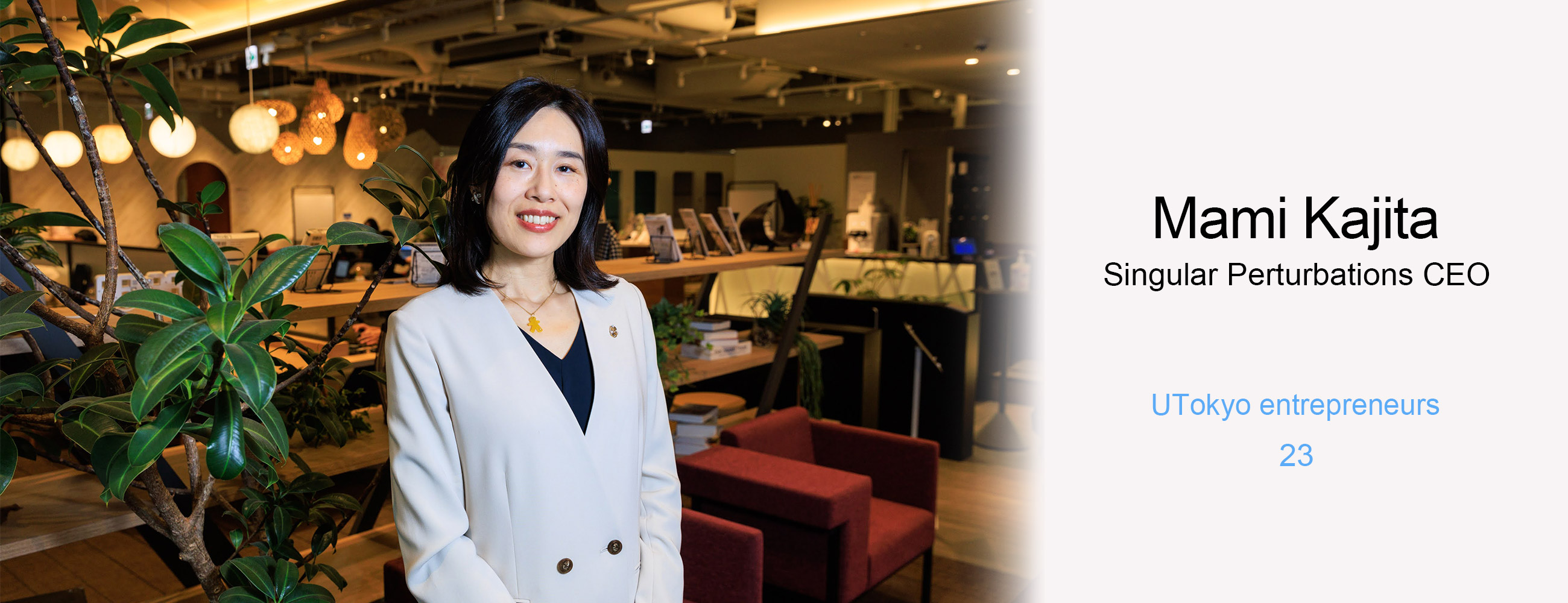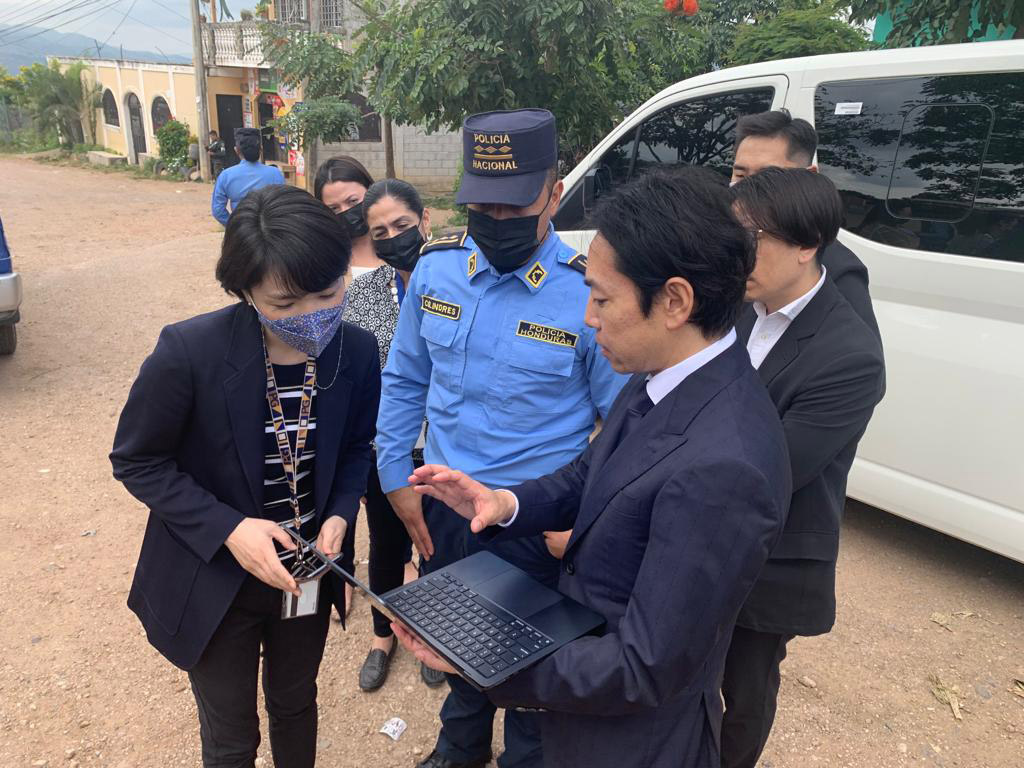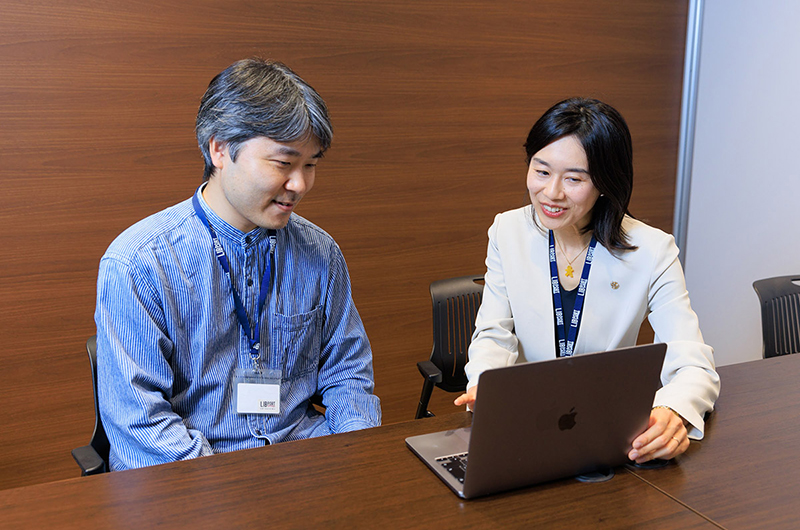Physicist’s crime prediction system reduces perturbing experiences Entrepreneurs 23

This series introduces entrepreneurs who have received startup support from UTokyo programs or who have utilized university research. UTokyo’s support aims to expand Japan’s innovation ecosystem.

Mami Kajita was walking alone on a bustling street in Bologna, Italy, one afternoon in 2014, when her wallet was stolen. After she reported the incident to the local police, Kajita learned that at the time of the theft — 1 p.m. on a Sunday — the street is mostly occupied by tourists rather than local residents, most of whom were presumably at home on the Sabbath, after attending church in the morning.
“If the thief were a pickpocket with a standard modus operandi, I figured it would be possible to predict such a crime before it happened,” Kajita, who is a statistical physicist by training, recalled thinking. This idea eventually led her to establish Singular Perturbations Inc. in 2017. Kajita is CEO of the Tokyo-based company, which offers products to support law enforcement patrol operations and security camera monitoring that use its proprietary crime prediction technology.
In Japan, Singular Perturbations provides support for crime prevention patrol to local governments, in addition to providing crime analysis software to the National Police Agency. Internationally, the company provides its crime prediction technology to police in Brazil, where crime is rampant, to enhance law enforcement surveillance. The startup aims to provide its technologies to insurance, travel and security companies to help reduce crime worldwide.
Triggering entrepreneurial streak

As a child, Kajita was fascinated with natural science, particularly after learning about black holes. Believing that understanding natural phenomena through mathematics suited her, Kajita entered Chiba University, a national university near Tokyo, after completing her second year of high school using a grade-skipping system. She then enrolled in the University of Tokyo’s Graduate School of Arts and Sciences, where she researched statistical physics, a field that focuses on studying macroscopic phenomena and building theories based on microscopic properties using the laws of mechanics.
She established a method applying a theory called singular perturbations, which later became the name of her company. The singular perturbation method is used to analyze situations where small perturbations (disturbances) in a system lead to a significant impact, or where abrupt or nonconsecutive changes that cannot be addressed through regular perturbation theory occur. Kajita used this technique to devise a novel theoretical approach capable of describing complex dynamic processes such as glass-liquid transition.
After completing the Research Fellowships for Young Researchers program of the Japan Society for the Promotion of Science, Kajita moved to Italy with her husband when he was transferred to Modena, a city in the northern part of the country, not far from Bologna, in 2014. As a kind of hobby, Kajita developed a mobile app for crime information utilizing open data and providing the service to general users.
“Research on statistical physics is deep in scope and very interesting, but I realized what I can contribute to the field in my lifetime is limited and the impact I can have on society is small,” Kajita said, explaining why she decided to change her career path from researcher to entrepreneur. “Theoretical physics is an academic discipline dedicated to grasping and modeling the essence of things. I had a strong desire to have an impact on society by the applying the skills I acquired as a physicist to a different field.”
Then Kajita had her wallet stolen in Bologna. The experience got her started on developing a mobile application to spread information on common crimes with a typical modus operandi, to reduce the number of street crimes, including pickpocketing — Kajita collected open data on crimes, arranged them with a natural language processing technique, and created an app that showed crime information on a map, which was easy to grasp. She then established her own prediction technology using the framework of theoretical physics. Her idea of combining an app with crime prediction caught the attention of a Japanese startup, which later bought the mobile application.
Kajita returned to Japan in 2016 for a short stint as an executive at that startup. In 2017, she joined UTokyo’s Center for Spatial Information Science, where she has been a visiting researcher. While researching crime prediction systems, she decided to establish Singular Perturbations, realizing she needed to set up a corporation to be involved in projects with prefectural police.
Pinpointing needs to overcome roadblocks
Kajita recalls the daunting challenges she faced, including financial issues she had to overcome to keep the company afloat. Another big challenge was finding people who had a need for a crime prediction system in Japan, which has one of the world’s lowest crime rates. Convinced that her Crime Nabi crime prediction system could benefit society, Kajita worked hard to build a robust business model through trial and error.
Crime Nabi predicts crimes based on two algorithms developed by Singular Perturbations: time-informed prediction and spatial prediction. The time-informed prediction method incorporates a model that applies a theoretical physics formulation, which suggests criminals have temporal patterns because they tend to repeat the same technique once they succeed in committing a crime. The spatial prediction relies on big data, including various spatial patterns of crime occurrence and demographic statistics, land-use data and weather. The startup developed a mathematical algorithm to pre-compress the massive data used, enabling prediction calculations to be made quickly and at a lower cost. The use of such models resulted in highly accurate predictions.
Singular Perturbations is currently providing its Japanese clients with a crime prevention patrol app based on Crime Nabi called Patrol Community. The app suggests optimal patrol routes, and offers a tool to create a daily report and manage operational data as a cloud service.
Eye on Latin America, travelers
In recent years, Singular Perturbations has conducted field test experiments in Central and South America, where crime rates are high. According to the results of the field tests, the crime prediction system helped reduce the number of thefts involving copper cables, such as those for traffic signals and telephone lines, by 68.5%. As a result, Crime Nabi was adopted by the Brazilian city of Belo Horizonte in December 2023. A similar demonstration was also conducted for the National Police of Honduras.
In 2023, the startup established a subsidiary in Sao Paulo, Brazil, to expand its business operations in Central and South America, a market that it regards as promising.
Kajita is now using a type of machine learning called transfer learning, enabling crime prediction in places where necessary crime data is lacking. “Our technologies will eventually allow crime prediction across the globe,” Kajita said. Using the technology, Singular Perturbations plans to offer an infrastructure system to enable insurance and travel companies to develop an app for travelers.
“For example, such an app can advise women travelers to return to their hotel by a certain time so they get back safely,” Kajita said. This idea will soon undergo verification experiments aimed at the general female population in Uruguay.
“I would be very happy if our technology can prevent a sad experience like the one I had when I became a victim of a pickpocket,” said the CEO, coming full circle to what led her to develop her crime prediction system and launch her startup in the first place.

Singular Perturbations Inc.
Established by founder and CEO Mami Kajita in August 2017, with the goal of “reducing sad experiences,” the company actively develops solutions to minimize global crime rates. It has leveraged artificial intelligence and computer science to create Crime Nabi, a system for crime reduction, and provides its services based on this platform, internationally. In Japan, the startup offers its cloud-based service Patrol Community, which supports security and patrolling operations through the application of crime prediction results. The company has engaged in research and development through programs such as the 2021 SBIR (Small/Startup Business Innovation Research) Promotion Program of the New Energy and Industrial Technology Development Organization (NEDO) and a commissioned research program (2018-21) of the National Institute of Information and Communications Technology (NICT). In 2021, it secured a total of 100 million yen in seed funding through a third-party allotment to venture capital firm B Dash Ventures Inc., as well as debt financing from a financial institution. The company is staffed by six members and additional personnel who are outsourced. Its Brazilian branch is currently staffed by a four-member team.
Date of interview: Nov. 9, 2023
Interview/Text: Yumiko Mori
Top and bottom photos: Public Relations Group







